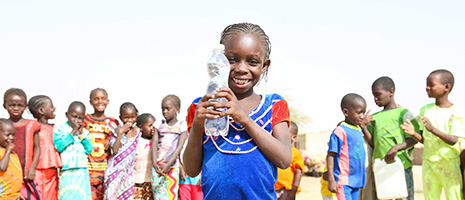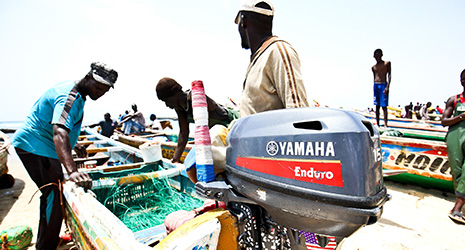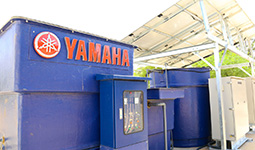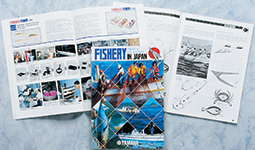Home > Highlighting JAPAN > Highlighting Japan July 2019 > Japan and Africa: Strengthening Bonds
Highlighting JAPAN


Improving African Quality of Life through Business
A Japanese company has been contributing to sustainable industrial advancement and quality-of-life improvement in Africa by dealing sincerely with African counterparts for more than fifty years.
About forty African countries face the sea, and water-related industries thrive along the coast of these countries. Fishing is also an important industry on Lake Victoria and Lake Tanganyika in eastern Africa, as well as on the Nile River.
The outboard motor plays a significant role in fisheries in these areas. In the past, hand-rowed and sail boats were the most common forms of boats in Africa, making the range of fishing limited. Attaching outboard motors to boats has expanded fishing ranges and increased the size of fishermen’s catch. Yamaha Motor Co., Ltd., headquartered in Iwata City, Shizuoka Prefecture, has made great contributions to the development of fishing in Africa.
Shin Iwasaki, Senior Supervisor of the PR Group of the company, said, “We introduced outboard motors in Africa in the 1970s. At that time, African fishermen had no funds to purchase outboard motors. But we thought that if we could improve fishermen’s income by supporting the development of African fisheries, our efforts would lead to outboard motor sales.”
Subsequently, Japanese official development assistance (ODA) triggered the expansion of business. Yamaha also worked on maintenance education as well as outboard motor sales. In addition, in 1977 the company started to publish an English-language magazine named Fishery Journal (partially in French and Spanish) containing information about fishing methods they had investigated in many parts of Japan, how to keep fish fresh aboard ship, and methods of processing and selling fish, using an abundance of illustrations and pictures. Yamaha distributed copies free of charge for people engaging in coastal fishing in Africa.
But in Africa people need to operate outboard motors for many hours on boats with a heavy load, and fuel is also of poor quality. In addition, people often use outboard motors in muddy, gravelly waters, frequently causing them to break down. The company worked not only to develop products that were more durable and easier to repair but also to train and nurture the local mechanics who do the maintenance and repairs in an effort to build after-sales service networks for dealing with breakdowns quickly.
PR Group Manager Takashi Mibu said, “Because the breakdown of outboard motors could be fatal, it is important to build a local maintenance system. We recruited local people who had experience in car maintenance and trained them as outboard motor mechanics.”
Yamaha contributes to the independence and sustained development of African fisheries by providing the variety of services and expertise that meet the needs of the local people, in addition to selling products.
The company also provides technical support for the local manufacturing of fiberglass reinforced plastic (FRP) boats. The shift from previously common wooden fishing boats to more durable FRP boats reduced the use of lumber for wooden boats, which eventually led to a reduction of deforestation. This also contributed to the safety of fisheries and created jobs.
In Mauritania, where seafood, including octopus, is an important export commodity, Yamaha responded to a request in 2011 for technical support from a local government-affiliated company. The company provided support for the construction of a boat-building factory for coastal fisheries in Nouadhibou, a port city in the northern part of the country. Yamaha offered advice on factories, equipment and tools necessary to build FRP boats and provided know-how related to the models of boats, indispensable for mass-production, as well as production and manufacturing techniques, factory management, and quality control. The first boat was completed and launched in 2014.
In addition, the company cooperates with the Ministry of Foreign Affairs and the Japan International Cooperation Agency (JICA) in popularizing a small-sized water-purifying device. The device has a simple structure based on a natural water-purifying mechanism and is distinguished for needing neither a large amount of electric power nor maintenance by a professional engineer. The water-purifying device can supply 8,000 liters of purified water per day (enough for about 2,000 people) from river or lake water, and as of the end of June 2019 twenty-one units have been set up in eight African countries. The technology improves people’s lives by reducing disease and saving women and children the work of drawing water.
Yamaha is also making future plans for developing new businesses, such as a logistics system project using IoT (Internet of Things) technology. The products and services of a Japanese company are steadily changing the lives of people in distant Africa.
© 2009 Cabinet Office, Government of Japan








